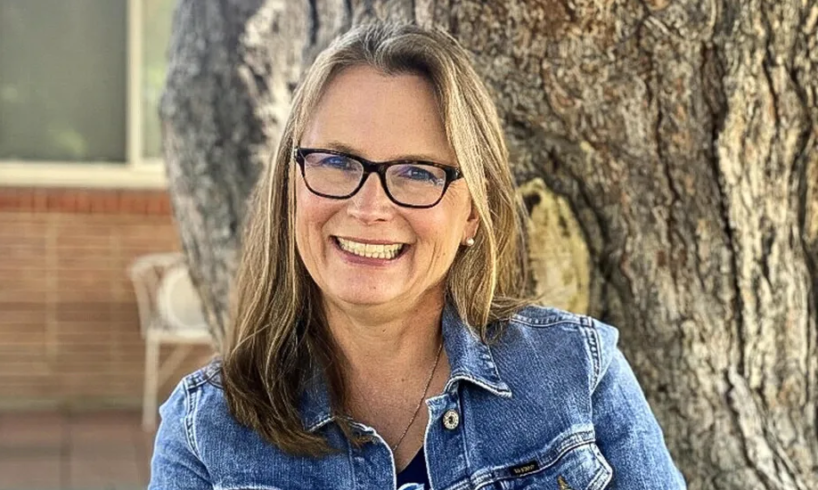
The Denver school board president, who was a bilingual teacher in the district for 33 years, is running for reelection to represent central-east Denver on the board.
Carrie Olson was elected to the board in 2017 and became president in 2019. As president, she led the district’s recent search for a new superintendent, and helped helm its response to COVID-19, including by answering parents’ questions in English and Spanish live on Facebook.
Olson, 59, was a Denver teacher from 1985 until shortly after she was elected, when she resigned in line with a district policy that bars employees from serving on the board. In her more than three decades in the classroom, Olson taught at elementary, middle, and high schools, and brought students from low-income families on field trips to Washington, D.C., and Europe. She now works as an adjunct education professor at the University of Denver.
“That perspective of so many years in the classroom is invaluable to have leading our district,” she said, adding that she’s dedicated to the work of the board.
In all, 12 candidates are running for four open seats in the Nov. 2 election. The winners will oversee the new superintendent, craft a new strategic plan, and grapple with several long-simmering issues, including declining enrollment and continued disagreement over the role of independent charter schools and semi-autonomous innovation schools.
Politically, Olson was in the minority when she was elected to the school board in 2017 with the backing of the Denver teachers union. Olson and the union opposed the reform policies put in place by previous boards, such as closing schools with low test scores.
Then, in the 2019 election, the board majority flipped in favor of union-backed members. Olson was elected president, and under her leadership, the board made big changes.
In the past two years, the board has taken a softer tone with low-performing schools, giving them a chance to show improvement. It also voted to reopen two comprehensive high schools in communities of color — West High and Montbello High — that previous boards had dismantled.
The board approved a new labor union for principals, got rid of the district’s controversial school ratings system, and removed police officers from schools. It also attempted to delay the opening of a new charter high school and did delay the expansion of two autonomous innovation zones. In response to the advocacy of Black students, the board voted to make the district’s curriculum more inclusive of Black, Latino, and Indigenous history.
Olson has dealt with controversy in her time as president. Most recently, she led the board through an investigation of member Tay Anderson, which did not substantiate claims of sexual assault. Olson voted to censure Anderson for other conduct uncovered by the investigation.. Last year, city leaders blamed a “dysfunctional” school board for pushing out former Denver schools Superintendent Susana Cordova.
Olson is proud of the process she led to hire Cordova’s replacement, Alex Marrero, which included a student-led town hall with the finalists. If reelected, Olson said one of her priorities would be ensuring Marrero is successful. She said she’d also focus on strengthening traditional district-run schools, lifting up student voices, and recruiting and retaining teachers of color.
The board has long supported diversifying the teacher workforce, but the district has struggled to make much progress.
“One of the things that I see that happens is we as a board set forward a vision and a mission about something and then we walk into the schools and we talk to people and they’re like, ‘Uh-uh, that’s not happening,’” Olson said. “I don’t think that there’s people actively working against the board’s vision. I just think that we’re a large school system, and there is a lot of institutional racism. … So how can we better bridge that gap?”
Denver Public Schools is Colorado’s largest school district, serving about 90,000 students. A little more than half of students are Hispanic, 26% are white, and 14% are Black. Its school board has seven members — five regional and two districtwide.
The central-east part of Denver Olson is vying to represent stretches from Capitol Hill to Lowry.
We asked her about several key issues the district will face in coming years.
Declining enrollment and a growing number of small schools: Olson was a teacher at Kepner Middle School when the district closed that school. She said her voice as a teacher, and the voices of students and families, weren’t heard. She wants the district to work with community members now to come up with solutions.
“I just really want to see what people in that situation are thinking about, what’s on their minds, and how can I lift up what they’re saying because people know their communities best,” she said.
Charter and innovation schools: While she has been skeptical of publicly funded, privately run charters, Olson said the students who attend them are Denver Public Schools students. Her job as a board member is to make sure charters are serving their students well, she said.
“Under my board tenure, seven charter schools have closed, a lot of them due to enrollment,” she said. “But I haven’t purposely gone out and said, ‘You need to close,’ because it’s traumatic.”
Improving education for Black and Hispanic students: Olson is passionate about bilingual education and said if reelected, she’d look into expanding popular dual language programs.
“I would love to see students being able to continue … to develop their other languages other than English along with English — and valuing that,” Olson said.
Olson said she fully supports a Black Excellence resolution passed by the board, but schools need more support in carrying out the directive to improve education for Black students. “How are we supporting each school to say, ‘What does that mean for you?’” she said.
This article was originally posted on Why Denver school board President Carrie Olson is running for reelection